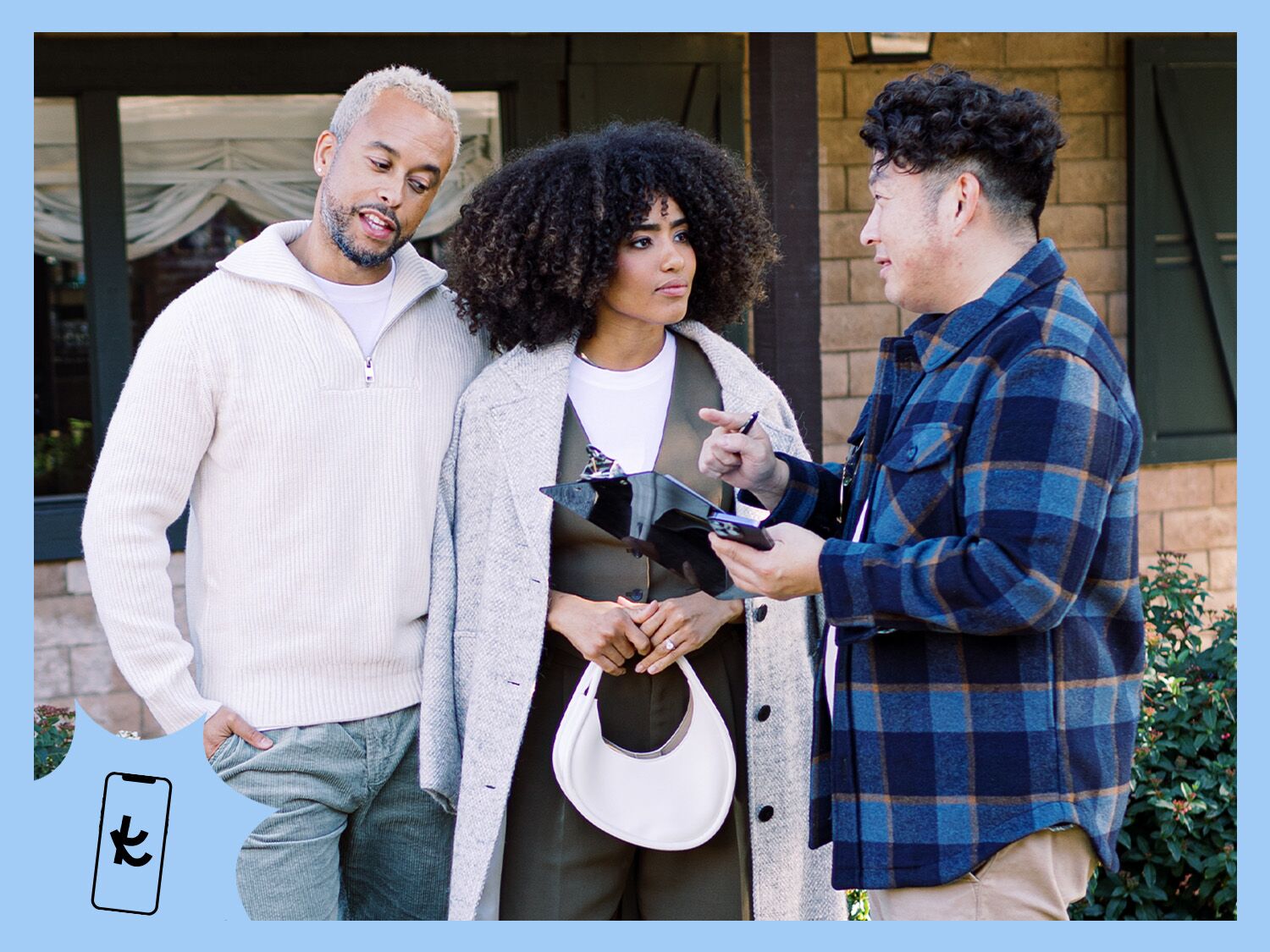Here's a Breakdown of All the Different Types of Wedding Planners

Couples planning weddings should get gold medals in decision making. Between selecting a venue, photographer, florist and more, it's natural to want (or need) some help ironing out the details of the day. Luckily, there are different types of wedding planners to lift however much weight off your shoulders as you wish. From full-service wedding planners, to day-of coordinators, to destination event designers, you have a wide range of planning professionals to choose from. And we'll help you consider your options to find the planner that works best for you (because yes, you really do need one).
We enlisted Danielle Couick, owner and principal planner of full-service event planning and design firm Magnolia Bluebird Design & Events in Rockville, Maryland, to speak to some of the most common wedding planners and coordinators. And fortunately, The Knot Vendor Marketplace lets you refine results for wedding planners by their services after you filter by your wedding location, so you can easily pinpoint the pro you're looking for. And while their offerings are especially tailored, every type of wedding planner has one thing in common: They make the planning process go smoothly from the proposal to the final champagne pop.
In this article: Full-Service | Coordinator | À la Carte | Destination | Specialist | Bilingual | Decorator/Designer
Full-Service Wedding Planner
"A full-service wedding planner helps you plan everything from start to finish for the wedding day or for a weekend of events," Couick says. The full wedding-planning services of this pro are likely what you think of when you hear "wedding planner." From start to finish, a full-service planner will take care of everything and is the best option for couples short on time, inspiration or motivation (and those that have a higher budget set aside for a planner). Whatever the case, hiring a full-time planner can help alleviate the pressure you may be feeling about the wedding day.
What a full-service wedding planner helps you with: A full-service wedding planner can help you create (and stick to) your budget, manage your planning timeline, recommend and hire wedding vendors, help with event design and facilitate venue tours. And that's just the beginning. Full-service planners will also help you with your guest list, invitations, RSVPs, day-of timelines, floor plans and on-site management. Basically, they're there to take the stress out of your big day so you can focus on what really matters: enjoying the celebration.
Wedding Coordinator
Different from a wedding planner, who takes care of the entire event, a wedding coordinator hones in on the logistics of the day itself, ensuring all runs smoothly. Wedding coordinator services come in two forms: month-of and day-of coordinators.
Month-Of Wedding Coordinator
A month-of wedding coordinator will step in much closer to your wedding day. "Don't let the name fool you," Couick says. "Coordinating your wedding effectively and professionally requires experience, skill, time and some advanced planning, so month-of coordination usually starts four to eight weeks from your wedding date."
What a month-of wedding coordinator helps you with: These pros will review final vendor contracts, finalize day-of needs (last minute details, payments, tipping), conduct the final walk-through, sign off on your wedding-day timeline, organize your floor plans and guest count, work with your vendor team and coordinate the wedding rehearsal and wedding day.
Day-Of Wedding Coordinator
A day-of coordinator handles truly last-minute details and might not step in until the week before your wedding date. Their job is to ensure the choreography of your day is followed, keeping things moving along as they should (because someone has to know when to peel you away from dinner to cut the cake). Note: Many planning companies offer "day-of coordinators" that are actually month-of coordinators, so read a wedding planner's contract and package descriptions carefully, and have a slate of questions for your wedding planner ready so you know what you're getting. And according to The Knot 2023 Real Weddings Study, 36% of couples who hired a wedding planner booked a day-of pro, making them the most popular of the different types of wedding planners.
What a day-of wedding coordinator helps you with: This type of wedding planner assists in doing the heavy lifting (figuratively and sometimes literally) required the day of, like making sure vendors arrive on time and maintaining the schedule of events so you can soak up every minute without worry.
À la Carte Wedding Planner
Part-time or à la carte wedding planners offer all of the expertise of a full-time planner, but only for the aspects of your choice, so you can customize your wedding organizer package to suit your specific needs. If you've got most of the wedding planning under control, but could use a helping hand for some things, a part-time planner is perfect for you. Part-time planners are also a more budget-friendly way to get professional help with your wedding. Delegate away!
What an à la carte wedding planner helps you with: There are two major ways these planners help to-be-weds. The first: giving vendor recommendations. Since planners spend time cultivating relationships with vendors, they can give you a list of trusted pros to work with. You do the contacting, negotiating and managing, but your planner would be there to provide design support and on-site execution. "It feels like a win-win because you'll get good referrals from a trusted source, plus your planner's creative eye," Couick says. Another way partial planners can help you? Coordinating the most important aspects of your wedding. "You get the professional support you need where you need it most, [but] it lacks a more cohesive bird's-eye view of your overall wedding."
Destination Wedding Planner
A destination wedding planner is essentially a full-service planner with expertise in planning events at your far-flung wedding site. "Getting married on a pristine shoreline or at a centuries-old manor across the pond is the most beautiful vision you can think of—but travel itineraries, customs, language and cultural barriers, and logistics for a weekend of events for your entire guest list, is not," Couick says. If you want the entire experience to be as great as the wedding itself, tapping a destination planning pro might be the best choice for your nuptials.
What a destination wedding planner helps you with: "In addition to the full-service scope of planning, this pro can help you scout the perfect location, wedding venue and vendors; support your guests with travel and accommodations; design trip itineraries; and navigate cultural differences, laws and regulations," Couick notes.
Wedding Specialist
The difference between a wedding planner and a wedding specialist is that a wedding specialist is typically part of the venue's planning team, focusing mostly on weddings, while a wedding planner has other duties that go beyond just the event-planning basics. Though do note that the terms sometimes are ambiguous and used interchangeably.
What a wedding specialist helps you with: A wedding specialist assists in planning the logistical elements of your day through the lens of the venue. They'll have recommendations for vendors that are familiar with the venue and can also run you through any inclusions or in-house vendors the location might have, like on-site catering.
Bilingual Wedding Planner
These planners speak two or more languages and can be helpful in a variety of situations. Perhaps the couple speaks English, but would like to involve a set of parents who better communicate in a different native language. Or one partner and their family might not speak the primary language of the country you're planning to wed in. Or perhaps you're both getting married in a destination where neither one of you is familiar with the native tongue. But even if you're saying your "I do"s stateside, it's easy to find these special planners through The Knot Vendor Marketplace—simply check the corresponding box to filter your results.
What a bilingual wedding planner helps you with: Bilingual wedding planners come in all of the types of pros listed above; they'll just have the additional benefit of being able to communicate in multiple languages. It's wise to be clear on your planner's specific offerings for this reason.
Wedding Decorator/Designer
Last, but certainly not least, are wedding designers or wedding decorators. This type of professional is very different from a planner, which may come as a surprise to many to-be-weds. While wedding planners handle logistics, timelines and other vendors, wedding decorators take care of your floor plan and the overall wedding venue design and aesthetic. These experts are a great option if you've got the planning and logistics of your wedding on lock, but you want help bringing your creative vision to life. A professional event designer will help you turn all of those Pinterest collections and mood boards into reality.
What a wedding designer or decorator helps you with: They'll listen to your ideas and assess the logistical parameters of your wedding by viewing the space and working within your budget. "They'll develop a cohesive and stylish look, feel, mood and overall aesthetic of your wedding day in a realistic way," Couick says























